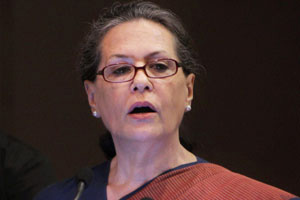
New Delhi, December 19: Taking serious note of the ghastly incident of the gangrape of a girl, Congress President Sonia Gandhi today shot off strong-worded letters to Home Minister Sushilkumar Shinde and Delhi Chief Minister Shiela Dikshit, saying it was a "matter of shame" that such incidents happen with painful regularity.
Gandhi tonight visited Safdarjung Hospital here to inquire about the condition of the 23-year-old victim, who is in a critical state, after Sunday night's incident, and sought "strictest possible measures" to ensure that there is no recurrence of such a barbaric crime.
Gandhi, who was at the hospital for about 15-20 minutes, talked to the doctors and met the victim's parents, according to Congress General Secretary Janardan Dwivedi. Gandhi was told by the doctors that the girl was in a critical state, he said.
The Congress leader said in her letter to Dikshit that "such violence and criminality needs
not only to be condemned, it calls for a concerted effort to fight it."
In her letter to Shinde, the Congress President said "It is a shame for us, who are responsible for the security of our cities that a young woman can be raped in a moving bus in the capital of the country and flung on to the street."
Describing the incident as a "monstrous crime", Gandhi said this deserves not only universal condemnation but also the "Government's most urgent attention".
"It is imperative that the police and other agencies concerned are sensitised to the dangers that our daughters, sisters and mothers face everyday. The security agencies must be motivated, trained and equipped to deal with the menace. I hope you will initiate immediate action to remedy the situation," Gandhi told the Home Minister.
In the letter to Dikshit, Gandhi said, "it is a matter of shame that these incidents happen with painful regularity and that our daughters, sisters and mothers are unsafe in our Capital Delhi.... I would urge you to take whatever steps are necessary to undertake community action, to strengthen law and order and to step up vigilance to protect women."
Gandhi told the Delhi Chief Minister that there was an "urgent need to demonstrate our sincerity and determination" and that "we are all horrified" over the incident.
She also assured Dikshit "you have my support and support of our party organisation in whatever efforts you need to take to curb the menace".
Related: Delhi rape: Sonia demands action, says 'our daughters, mothers, sisters are unsafe'





Comments
Add new comment